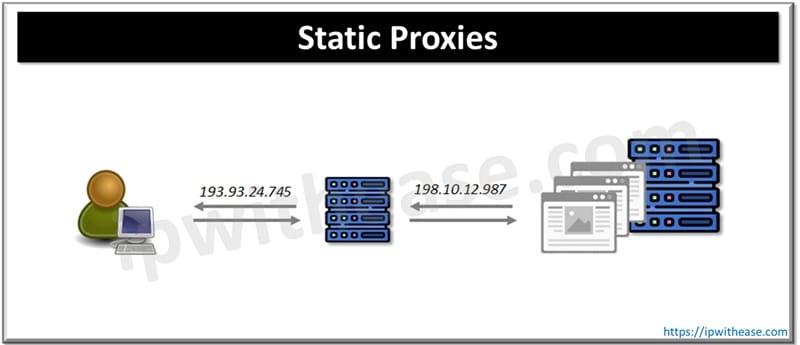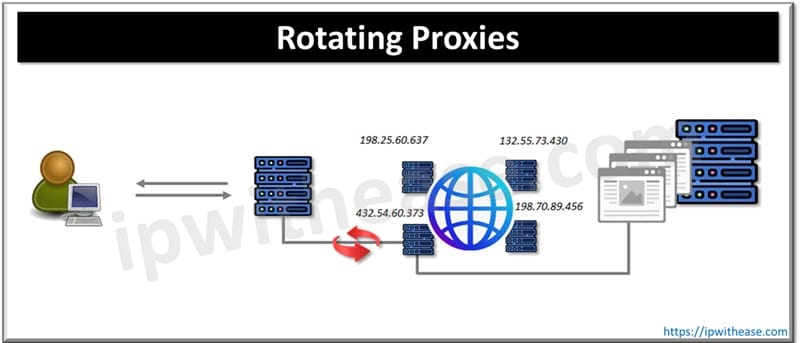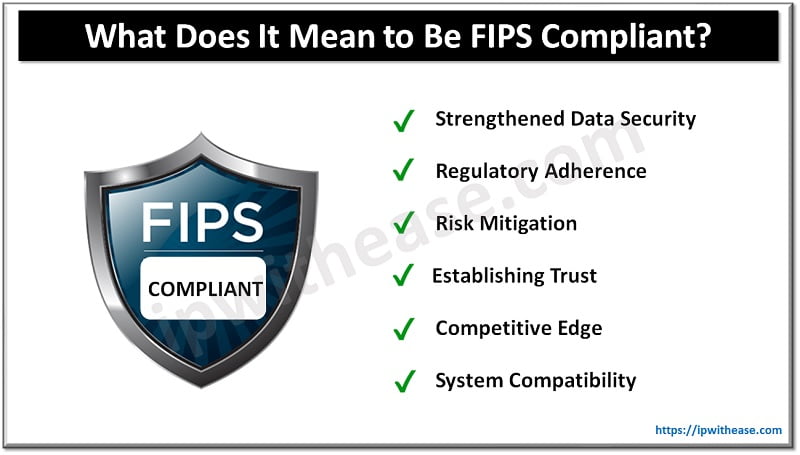Table of Contents
Static proxies provide a fixed IP address, ideal for consistent identity. Rotating proxies change IPs per request/session hence are best for anonymity and large-scale scraping. Choosing the right type of proxy can seriously impact how smooth or frustrating your web scraping, automation, or market research operations go. The wrong kind will waste time and money. The right one? Gives you stealth, speed, and scale.
So let’s cut through the noise and figure out what really matters when deciding between static and rotating proxies. If you’re looking for solid proxy solutions, then go for a proxy solution service that offers both types with flexible options.
What Are Static Proxies?
Static proxies, also called dedicated or datacenter IPs, give you a fixed IP address that stays the same every time you connect. That stability is their main strength. It’s like renting a private parking spot. No surprises, no rotations.

They’re usually faster than rotating proxies because they don’t rely on residential ISPs. Lower latency, fewer connection hiccups. For account management, web testing, or anything needing persistent sessions, static proxies are gold. You log in, you stay logged in. No risk of triggering alerts due to IP changes.
Still, they’re easier to detect and block. Platforms spot repeated requests from a single datacenter IP and throw up firewalls or captchas. That’s why scrapers and sneaker bots often avoid them.
When Static Proxies Make Sense
Here are a few cases where static IPs just work better:
- Account-based tasks: Need to manage multiple social or e-commerce accounts? Static proxies keep sessions stable.
- Website testing: Perfect for QA teams checking how a site behaves in different locations.
- SEO tools: Want to track keyword rankings or backlinks without rotating IPs mid-session? Static does the trick.
In short, when consistency beats anonymity, static is the way.
What Are Rotating Proxies?
Rotating proxies do exactly what it sounds like. They switch your IP address either per request or at regular intervals. Instead of one stable identity, you get many. It’s like driving different rental cars every day.

Most rotating proxies use residential IPs, meaning your traffic looks like it comes from actual people. That’s a huge plus for web scraping, especially against sites that aggressively block automation.
With this kind of setup, you’re less likely to get blacklisted. One request goes out through one IP, the next through another. Harder for target websites to pin you down.
Benefits of Rotating Proxies
For businesses that need volume, speed, and anonymity, rotating proxies are often the go-to. Here’s why:
- Web scraping: Ideal for scraping product data, news sites, or public records at scale.
- Price monitoring: Check thousands of items across multiple locations without getting blocked.
- Ad verification: Need to see what users in different cities are actually seeing? Rotating proxies let you simulate that.
If your priority is staying under the radar while pulling data fast, rotating proxies are built for it.
Related: Proxy vs NAT
Differences: Static vs Rotating Proxies
Still unsure? Here are some core distinctions you should look at when choosing for your business:
| Feature | Static Proxies | Rotating Proxies |
|---|---|---|
| IP Persistence | Same IP, every time | IP changes frequently |
| Detection Risk | Easier to detect and ban | Much lower risk if configured right |
| Speed | Often faster (datacenter connections) | Depends on residential ISP speeds |
| Cost | Usually cheaper per IP | More expensive (especially residential IPs) |
Download the comparison table: Static vs Rotating Proxies
So which one fits your use case? Depends on what matters more: stability or scale.
When to Use Which: Real-World Scenarios
Let’s get practical. Here are a few typical business scenarios and which proxy type tends to shine:
- Managing social media at scale: Static proxies win here. You don’t want IPs jumping around and triggering account security checks.
- Scraping competitor prices: Rotating proxies keep things stealthy and unblockable, even across e-commerce giants.
- Running sneaker bots or automation scripts: Depends. If speed is key and the site doesn’t block datacenter IPs? Static might work. But for high anti-bot defenses? Rotating is safer.
- Monitoring SERPs or checking local ads: You need to simulate different users in different cities. Rotating residential proxies make that easy.
Questions to Ask Before Choosing
Don’t just pick based on features. Think use case first.
Ask yourself:
- How sensitive is my target site to IP bans?
- Do I need stable sessions or one-off requests?
- What’s more important, speed or invisibility?
- How much am I willing to spend on IP rotation?
If you’re not sure, test both. Many providers offer trial plans or pay-as-you-go options. A bit of upfront testing can save you headaches (and bans) later.
Pros and Cons at a Glance
Here’s a quick rundown to help lock in your decision:
| Feature | Static Proxies | Rotating Proxies |
|---|---|---|
| IP Type | Fixed | Changes per request/session |
| Best For | Account management, testing | Web scraping, ad verification |
| Speed | Fast (datacenter-based) | Varies (residential, slower) |
| Anonymity Level | Low | High |
| Risk of Getting Blocked | High | Low |
| Cost | Lower | Higher (especially for residential) |
| Ideal Usage Duration | Long sessions | One-off or short bursts |
Choose the wrong one, and you’ll be throttled, blocked, or flagged. Choose right, and your tasks fly under the radar.
Final Thoughts
No single proxy type is perfect for everything. If your tasks rely on long, stable sessions, static proxies are the better fit. If you’re after scale, flexibility, and staying under the radar, rotating proxies are more effective. The smartest approach is to choose based on specific needs and combine both when necessary to get the best of both worlds.
ABOUT THE AUTHOR
IPwithease is aimed at sharing knowledge across varied domains like Network, Security, Virtualization, Software, Wireless, etc.



